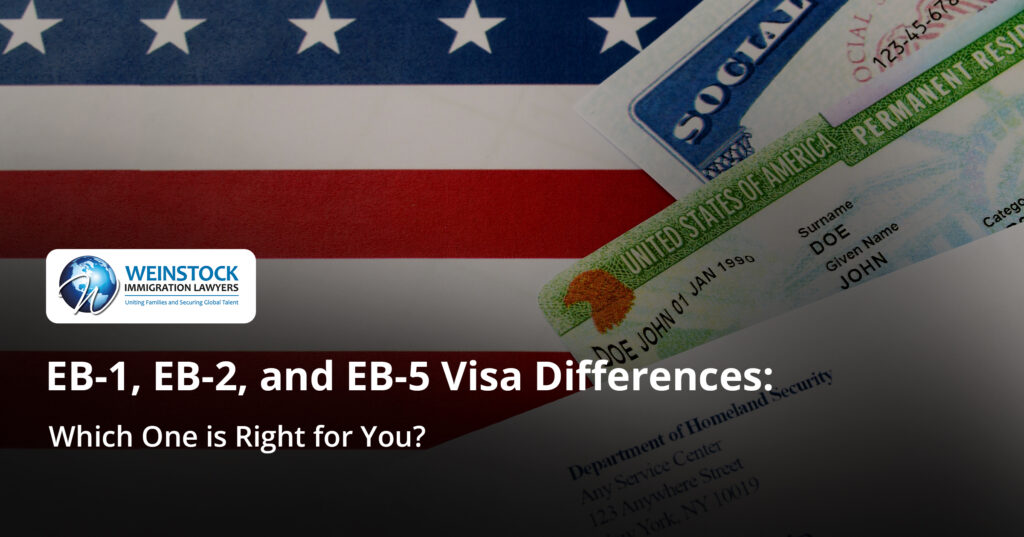Introduction: Which U.S. Green Card Path is Best for You?
For many professionals, skilled workers, and investors, the U.S. offers multiple pathways to permanent residency through employment-based visas. Among the most sought-after options are the EB-1 (Priority Workers), EB-2 (Advanced Degree or Exceptional Ability), and EB-5 (Immigrant Investors) visas.
Each visa serves a different purpose and has distinct eligibility requirements. If you’re considering moving to the U.S. for work, entrepreneurship, or investment, it’s important to choose the visa category that best aligns with your qualifications and long-term goals.
This guide will break down the differences between EB-1, EB-2, and EB-5 visas, making it easier for professionals and investors in Georgia and Alabama to understand which option suits them best.
What Is EB-1, EB-2, and EB-5 Visas?
The EB (Employment-Based) visa categories allow foreign nationals to gain permanent residency (Green Card) in the U.S. based on employment or investment.
- EB-1 Visa: For highly skilled professionals with extraordinary abilities, outstanding researchers, and multinational executives.
- EB-2 Visa: For professionals with advanced degrees or exceptional abilities in their field.
- EB-5 Visa: For foreign investors who invest a substantial amount in a U.S. business that creates jobs.
Now, let’s take a closer look at each visa type and its unique benefits.
EB-1 Visa: The Fast Track for High Achievers
Who Qualifies for the EB-1 Visa?
The EB-1 visa is for priority workers—individuals with top-tier credentials in their fields. You may qualify if you fall into one of these categories:
- Individuals with Extraordinary Ability: You must show proof of international or national acclaim in fields like science, business, arts, education, or athletics.
- Outstanding Professors and Researchers: If you have at least three years of teaching or research experience and an international reputation, you may qualify.
- Multinational Executives and Managers: This applies to individuals who have worked outside the U.S. for at least one year in a managerial or executive role in a company with a U.S. branch.
Why Choose the EB-1 Visa?
- No Labor Certification (PERM) Required: Unlike EB-2, you don’t need an employer to prove there are no qualified U.S. workers for your job.
- Faster Processing Times: EB-1 is a first-preference category, which means processing times are generally faster.
- Self-Petitioning Option: If applying under extraordinary ability, you can self-petition without an employer sponsor.
Example: A software engineer from India who has received major national awards for their work in artificial intelligence may qualify for EB-1 under the extraordinary ability category.
EB-2 Visa: For Professionals and Exceptional Talent
Who Qualifies for the EB-2 Visa?
The EB-2 visa is for professionals with advanced degrees and individuals with exceptional ability. You may qualify if:
- You have a master’s degree or higher, or a bachelor’s degree plus five years of progressive experience.
- You can prove exceptional ability in sciences, arts, or business, meaning your skills are significantly above what is normally expected.
- You qualify for a National Interest Waiver (NIW), which allows you to self-petition if your work benefits the U.S.
EB-2 vs. EB-2 NIW: What’s the Difference?
- Standard EB-2: Requires employer sponsorship and labor certification.
- EB-2 NIW (National Interest Waiver): Allows self-petitioning if the applicant’s work is in the national interest of the U.S. (e.g., medical researchers working on life-saving technology).
Why Choose the EB-2 Visa?
- Great for Highly Skilled Professionals: If you have an advanced degree, this visa is one of the best paths to a Green Card.
- National Interest Waiver Offers Flexibility: If your work benefits the U.S., you don’t need a job offer or labor certification.
Example: A civil engineer specializing in disaster-resistant structures may qualify under EB-2 NIW if their work significantly impacts U.S. infrastructure.
EB-5 Visa: The Investor Green Card
Who Qualifies for the EB-5 Visa?
The EB-5 visa is for foreign investors who create jobs in the U.S. To qualify, you must:
- Invest $1.8 million, or $900,000 if investing in a Targeted Employment Area (TEA).
- Prove that your investment will create at least 10 full-time jobs for U.S. workers.
Why Choose the EB-5 Visa?
- Direct Path to a Green Card: You and your family (spouse + unmarried children under 21) receive permanent residency.
- No Employment or Educational Requirements: Unlike EB-1 and EB-2, this visa is based solely on financial investment.
Example: A real estate developer who invests $900,000 in a commercial property project in a high-unemployment area can qualify for EB-5.
Comparing EB-1, EB-2, and EB-5 Visas: Which One is Right for You?
| Visa Type | Best For | Investment Required | Processing Time | Self-Petition Allowed? |
| EB-1 | Top-tier professionals, researchers, executives | No | Fast (6-12 months) | Yes (for extraordinary ability) |
| EB-2 | Advanced degree holders, exceptional talent | No | Varies (1-3 years) | Yes (for NIW applicants) |
| EB-5 | Investors creating jobs in the U.S. | $900K – $1.8M | Slow (2-5 years) | Yes |
How to Choose the Best Visa for Your Situation
Ask yourself:
Do I have extraordinary skills or achievements? → Consider EB-1.
Do I have an advanced degree and want a sponsored job? → Consider EB-2.
Am I an investor looking for a direct path to a Green Card? → Consider EB-5.
If you’re unsure which visa is right for you, consult with an immigration attorney who specializes in employment-based visas.
Final Thoughts: Choosing the Right U.S. Visa
The EB-1, EB-2, and EB-5 visas each offer a unique pathway to U.S. permanent residency. Whether you’re a highly skilled professional, an exceptional researcher, or an investor, understanding your options is the first step toward achieving your immigration goals.
If you live in Georgia or Alabama and need help determining which visa fits your situation best, schedule a consultation with our legal team to get expert guidance.

